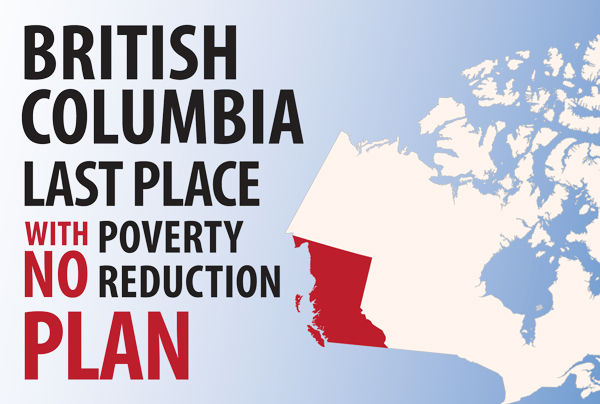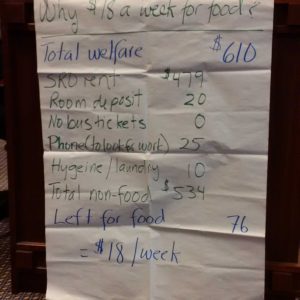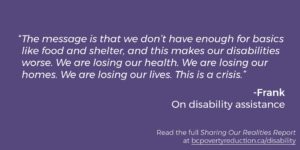
It’s time to be moved to action against poverty


I can tell you all the facts you want to know about the state of poverty in our province. Over half a million people in BC live in poverty. One in five children live in poverty. But facts are not enough; facts alone have never changed the world.
Homeless people are dying on the streets. Dying half a lifetime younger than the rest of us, at 40 years old instead of 80.
At the end of meetings in the Downtown Eastside, we have a tradition where we stand in a circle and hold hands and name the people who have died, and honour them with a moment of silence. There are always new names. People are dying of poverty in our communities.
Yet, Kelowna recently passed a by-law prohibiting people from sitting on the sidewalk day or night. Apparently, there had been complaints of “sidewalk obstructions.” Homeless people are now just “sidewalk obstructions.” We have dehumanized people to this extent.
It’s time to be moved to action. And that action needs to be focused on some big divisions here in BC. We have a huge inequality problem in our province. The wealthiest 20% of British Columbians own 75% of the wealth, while the bottom 20% are in debt by about $10,000. And with wealth comes security. Passed on by a handful of families, generation to generation. But now only a few people have that family safety net.
That’s why we need to re-build the social safety net, which is effectively what a poverty reduction plan is. A social safety net would provide adequate welfare when anyone needs it – not the deeply inadequate level of $610 frozen now for a decade – and it would provide housing, childcare, healthcare, education and training.

It would raise disability assistance rates substantially too. The increases over the last two years have been pitiful. In our upcoming report with Citizens for Accessible Neighbourhoods, Sharing Our Realities: Life on Disability Assistance in BC, Frank, one of the contributors, says, “the message is that we don’t have enough for basics like food and shelter and this makes our disabilities worse. We are losing our health. We are losing our homes. We are losing our lives. This is a crisis.”
To solve this crisis we need to break down the division between government and community. We’ve forgotten that our government is supposed to be our community. In fact, government could be the highest form of community. That’s where we can take care of each other with the biggest capacity.
But we’re still stuck thinking of poverty as an individual responsibility, that it’s people’s fault that they are poor because they’re not working hard enough or any number of those myths out there.
As we blame individuals for being poor, our community response to poverty and hunger is for individuals to give to the food bank. Can you imagine if we did the same for healthcare? I have some band-aids I’d like to donate and I could probably rustle up some Advil. It’s absurd but that’s what we do to tackle poverty.
Just as we pool our resources together for public healthcare, we need public poverty reduction. In an article in The Globe & Mail a week after the BC Budget was announced back in February, Stephen Quinn asked what he called a “befuddling” question: “Why are those on social assistance in BC ignored?” He then went through the possible reasons: the government doesn’t know, it lacks empathy, it doesn’t care, it’s okay with 100,000 people turning to food banks to feed themselves, there’s no money left (despite the surplus), they believe their “hand up, not a hand out” rhetoric, they think people on welfare are lazy, or it’s a cold, calculated political move because those on welfare are unlikely to vote for the Liberals anyway.”
Well, it’s got to be one or more of those reasons. But it’s not befuddling, it’s horrifying. People are dying under our government policies. We need to join hands in that circle and remember poor people in their death but, more importantly, work as hard as we can to value their life.
Work needs to continue beyond election day to make real, meaningful change.
It’s time to be moved to action.
Trish Garner is the Community Organizer with the BC Poverty Reduction Coalition. Their election campaign is Make Poverty Public to share stories and urge candidates to commit to public poverty reduction.
